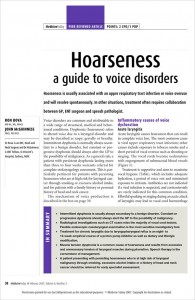A diverse range of conditions can affect the throat:
Tonsillitis
Tonsillitis refers to inflammation of the tonsils. The tonsils are two glands that sit at the back of the throat which are thought to assist with providing local immunity during early childhood. Each tonsil has numerous pits on its surface and crypts that extend all the way down into the depths of the tonsil.
Indications for tonsillectomy surgery include:
- Chronic recurrent tonsillitis
- Enlargement of the tonsils causing significant airway obstruction resulting in snoring and/or Obstructive Sleep Apnoea.
- Peritonsillar abscess formation
- One sided enlargement where there is concern about possible tumour formation
- Chronic expectoration of tonsil stones (offensive semi solid particulate matter which can build up in the tonsillar crypts)
Swallowing problems
Difficulty swallowing is called dysphagia and it’s usually a sign of a problem within your throat or oesophagus. The oesophagus represents the muscular tube that connects the throat to the stomach.
There are many causes of dysphagia and it’s important that an Ear Nose and Throat Surgeon (ENT) and/or Gastroenterologist further evaluate anyone with persistent dysphagia.
Causes of dysphagia include:
- Gastro-oesophageal reflux disease (GERD)
- Oesophagitis
- Oesophageal diverticula or Pharyngeal pouch
- Oesophageal or throat tumour
- Compression of the oesophagus or throat from an external source e.g. lymph nodes, tumours, bony spurs of the vertebrae or enlarged thyroid (Goitre)
- Neuromuscular problems related to previous stroke or brain injury
- Central nervous system problems such as multiple sclerosis, muscular dystrophy or Parkinson’s disease
- Intermittent Oesophageal spasm which is a localised form of muscular spasm that effects the oesophagus muscles
- Autoimmune conditions such as scleroderma
Gastroesophageal reflux disease (GERD)
Gastroesophageal reflux is a condition in which acid and stomach contents reflux back up into the oesophagus and sometimes up into the pharynx resulting in irritation. While the majority of patients experience a degree of heartburn, a lot of patients experience throat symptoms without any associated heartburn symptoms.
GERD can occur in all age groups and commonly affects healthy people.
Known risk factors for reflux include:
- Alcohol
- Obesity
- Pregnancy
- Smoking
- Hiatus hernia (a condition in which part of the stomach moves up into the chest resulting in loss of sphincter activity).
- Medication such as blood pressure medications, broncho-dilaters for asthma, Parkinson’s disease medications, antidepressants and sedatives.
Treatment options for reflux include:
- Diet modification. This includes minimising or avoiding the following: Fatty foods, alcohol, smoking, caffeine, chocolate, very spicy foods, carbonated fizzy drinks.
- Avoiding eating for at least 2-3 hours before lying down.
- Elevating the head of your bed by placing a brick or several blocks of wood under the bed head. The aim of this manoeuvre is to allow gravity to keep acid down in the stomach so that it does not reflux up into the oesophagus and subsequently up into the pharynx. Elevating your head with a pillow does not achieve this effect. If it is not possible to raise the head of the bed, then a rolled up blanket under the mattress at the head end achieves a similar effect.
- Over the counter medications such as Mylanta or Gaviscon.
- Prescription medications which include Antacid medication such as Zantac or Tagamet.
- Proton (pump) or acid inhibitors e.g. Losec, Somac, Zoton, Pariet.
- Prokinetic agents which stimulate oesophageal contraction down to the stomach e.g. Prepulsid.
- Patients with severe GERD sometimes require surgery which involves wrapping part of the stomach around the lower oesophagus to increase strength of the lower oesophageal sphincter (Nissen Fundoplication).
Voice problems
Voice disorders are very common and attributable to a wide range of medical and behavioral conditions. Hoarseness most commonly results from a laryngeal disorder and maybe described as raspy or breathy.
Conditions causing hoarseness include:
- Acute or Chronic laryngitis
- Vocal cord nodules, Polyps or Cysts
- Smoking induced Reinke’s oedema
- Viral papilloma (warts)
- Benign tumours
- Squamous cell carcinoma
- Neuromuscular disorders such as muscle tension dysphonia and spasmodic dysphonia
- Vocal cord paralysis
Patients with unexplained persistent hoarseness require comprehensive evaluation by an Ear Nose and Throat Surgeon so that a cause can be identified so that appropriate management can be instituted.
Please see Dr Bova’s article, published in Medicine Today, on Hoarseness: A guide to Voice Disorders for further information.

